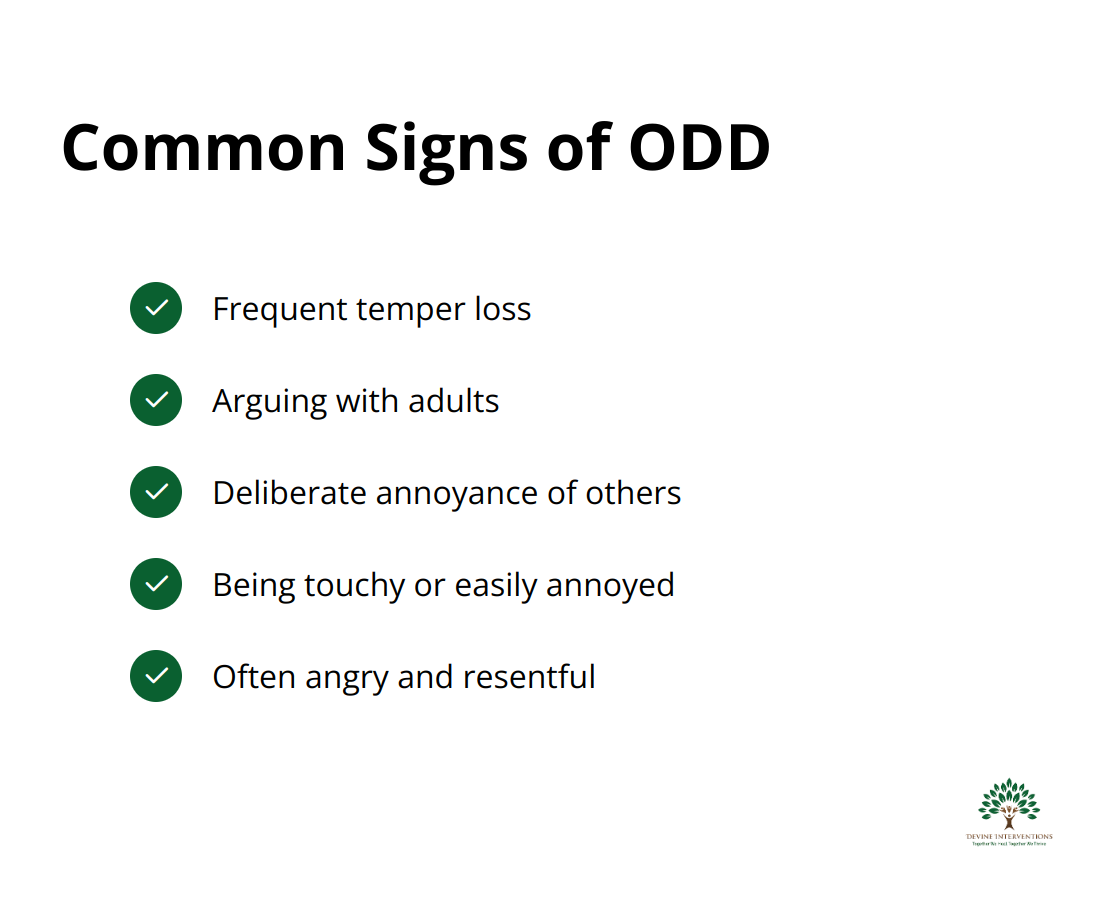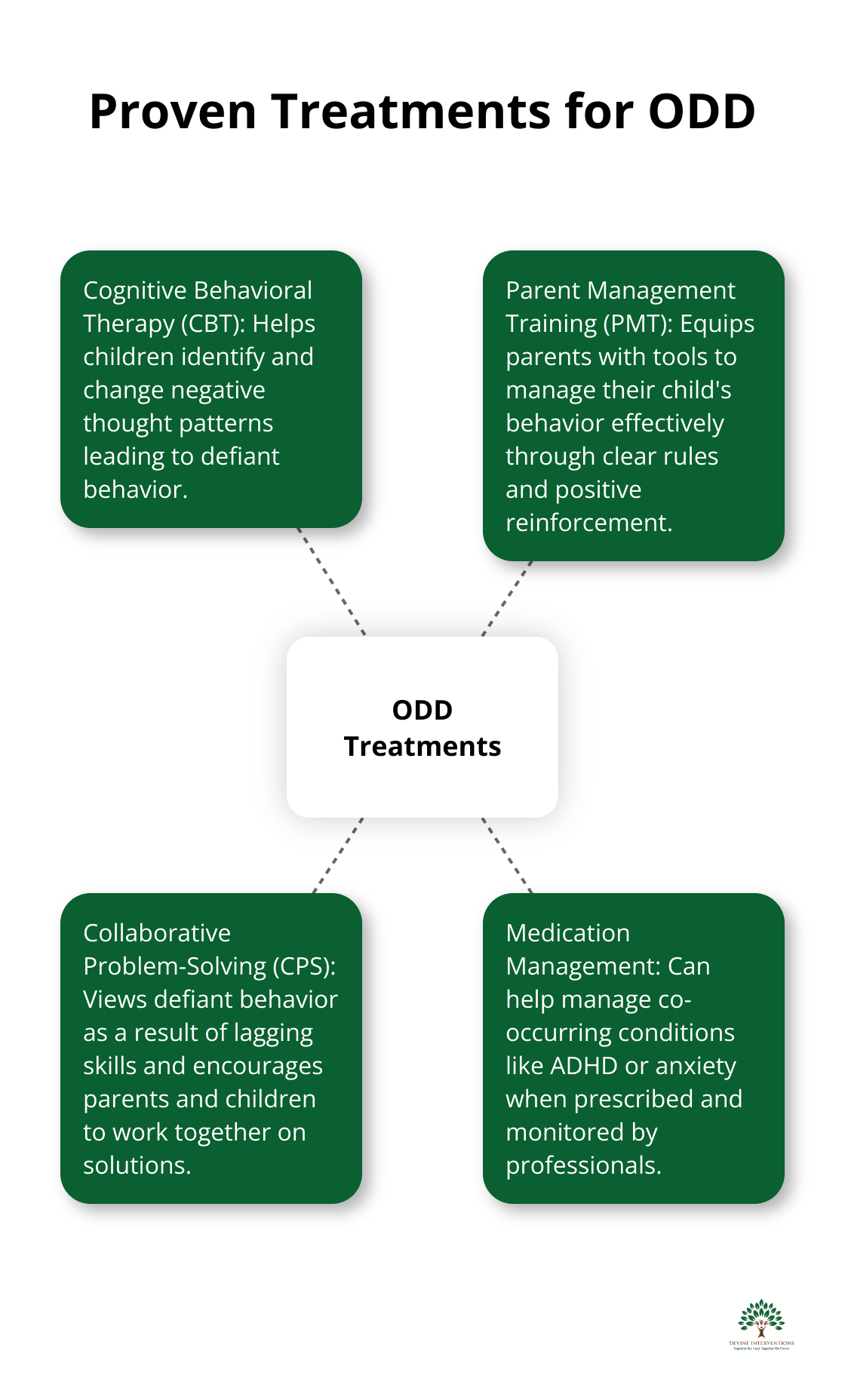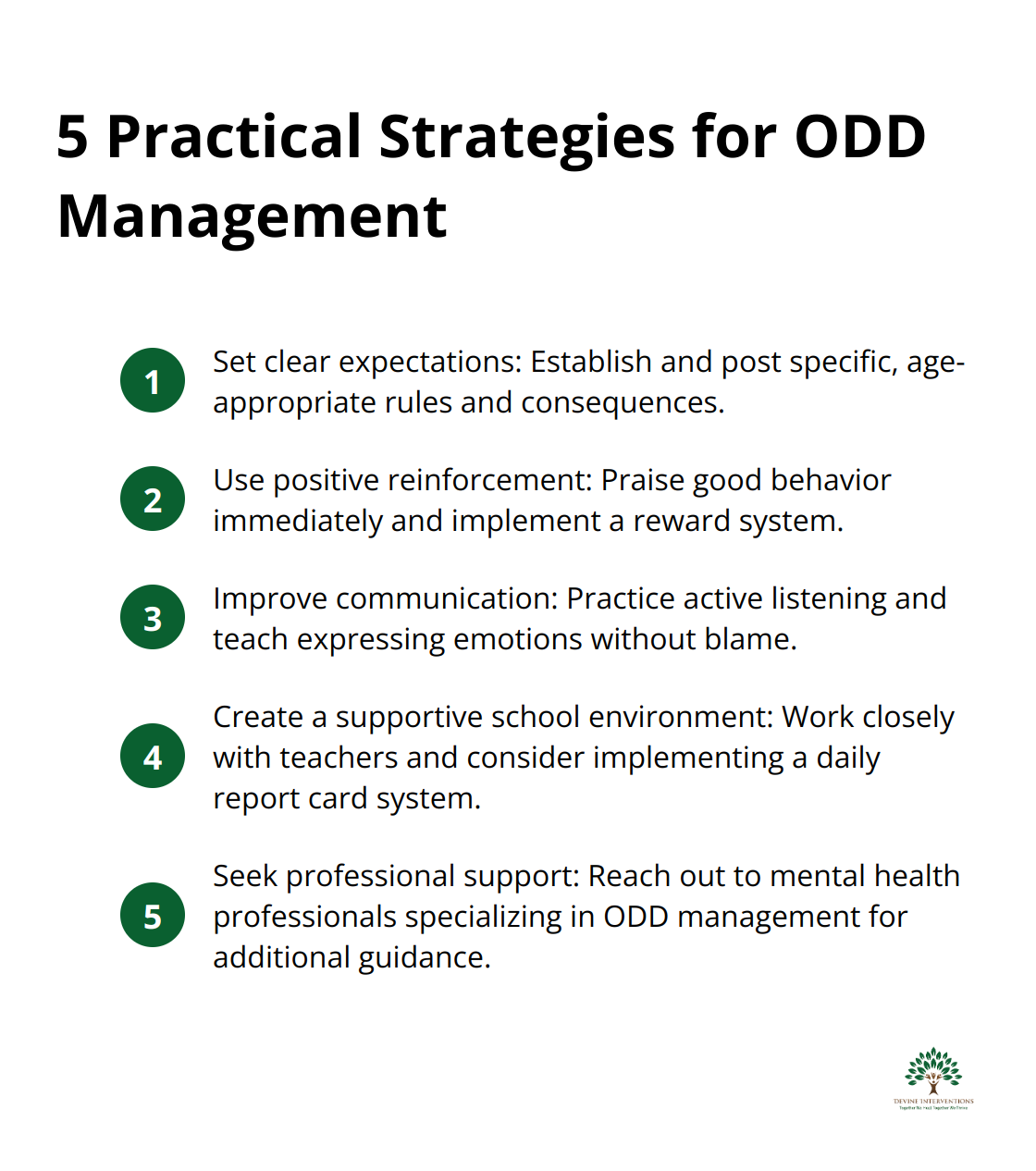Parenting a child with Oppositional Defiant Disorder (ODD) can be challenging and emotionally draining. Many families in Beltsville struggle to manage their child’s defiant behavior, feeling overwhelmed and unsure where to turn.
At Devine Interventions, we understand the complexities of ODD and its impact on families. This guide will explore evidence-based treatments and practical strategies to help you effectively manage ODD, bringing hope and positive change to your household.
Understanding Oppositional Defiant Disorder (ODD)
What is ODD?
Oppositional Defiant Disorder (ODD) challenges many families in Beltsville and surrounding areas. This behavioral condition manifests as a persistent pattern of angry, irritable mood, argumentative behavior, and vindictiveness lasting at least six months.
Recognizing ODD Symptoms
Children with ODD often display defiant behavior towards authority figures, including parents and teachers. Common signs include:

These behaviors extend beyond typical childhood tantrums and can significantly disrupt daily life.
ODD in Beltsville: A Growing Concern
While exact local statistics are limited, mental health professionals in Beltsville report an increase in ODD cases. This trend aligns with national data, though specific percentages for children aged 2-8 years receiving an ODD diagnosis are not confirmed.
The Ripple Effect on Families and Communities
ODD impacts more than just the child; it affects the entire family unit and extends into the community. Parents often feel overwhelmed, stressed, and isolated. Siblings may experience neglect or resentment due to the attention required by the child with ODD. In schools, teachers struggle to manage disruptive behaviors, affecting the learning environment for all students.
The Path Forward
Understanding ODD marks the first step towards effective management. If you recognize these symptoms in your child, know that you’re not alone, and help is available right here in Beltsville. Early intervention prevents the escalation of behaviors and improves outcomes for your child and family.
As we move forward, we’ll explore evidence-based treatments that address the root causes of ODD and equip families with practical strategies for long-term success. These approaches (including Cognitive Behavioral Therapy and Parent Management Training) offer hope and a clear path to positive change in your household.
Proven Treatments for ODD
Cognitive Behavioral Therapy (CBT)
CBT stands as a cornerstone in ODD treatment. This approach helps children identify and change negative thought patterns that lead to defiant behavior. A recent study aimed to examine the effectiveness of CBT in addressing mental health problems of children and adolescents in foster and institutional care. In CBT sessions, therapists work with children to:
- Recognize triggers for angry outbursts
- Develop coping strategies for frustration
- Practice problem-solving skills
- Express emotions in healthier ways
Parents often participate in CBT sessions, learning techniques to reinforce positive behaviors at home.
Parent Management Training (PMT)
PMT equips parents with tools to manage their child’s behavior effectively. A study compared two group intervention strategies aimed at parents of primary school-aged children with Oppositional Defiant Disorder. This approach focuses on:
- Establishing clear, consistent rules
- Using positive reinforcement techniques
- Implementing appropriate consequences
- Improving parent-child communication
Collaborative Problem-Solving (CPS)
CPS views defiant behavior as a result of lagging skills rather than willful disobedience. In CPS, parents and children work together to:
- Identify specific problems causing conflicts
- Explore each other’s concerns
- Brainstorm mutually satisfactory solutions
Medication Management
While medication isn’t a first-line treatment for ODD, it can help manage co-occurring conditions like ADHD or anxiety. Psychiatrists carefully assess each child’s needs before considering medication options.
When prescribed, professionals closely monitor medications and adjust as needed. The American Academy of Child and Adolescent Psychiatry reports that combining medication with behavioral therapies can improve outcomes for children with ODD and co-occurring conditions.
Tailored Treatment Plans
Evidence-based treatments (such as CBT, PMT, and CPS) form the foundation of effective ODD management. However, each child and family has unique needs. Mental health professionals create comprehensive treatment plans that address ODD symptoms effectively by combining these approaches.

Early intervention plays a key role in managing ODD. If you notice persistent defiant behaviors in your child, don’t hesitate to seek professional help. Experienced therapists and psychiatrists can provide the tools and strategies you need to restore harmony in your home.
Now that we’ve explored proven treatments for ODD, let’s look at how to implement these strategies in daily life at home and school.
Practical Strategies for ODD Management
Set Clear Expectations
Establish a set of clear, age-appropriate rules and consequences. Write them down and post them where everyone can see. Be specific about desired behaviors and potential outcomes. For example, “Complete homework before screen time” or “Speak respectfully to family members.” When rules are broken, follow through with predetermined consequences consistently.
Use Positive Reinforcement
Catch your child being good and praise them immediately. Be specific in your praise, such as “Great job putting your toys away without being asked!” Use a reward system for positive behaviors. This could be a sticker chart for younger children or a point system for older ones. Rewards don’t have to be material; extra time with a parent or a special privilege can be powerful motivators. Research indicates that behavioral interventions not only help reduce the symptoms of ODD but significantly improve relationships within the family.

Improve Communication
Practice active listening with your child. When they’re upset, reflect back what you hear them saying. This shows you’re trying to understand their perspective. Use “I” statements to express your feelings without blame, such as “I feel frustrated when chores aren’t done” instead of “You never do your chores.” Teach your child to use similar language to express their emotions.
Create a Supportive School Environment
Work closely with your child’s teachers to ensure consistency between home and school. Share successful strategies and discuss challenges. Consider implementing a daily report card system where teachers provide feedback on specific behaviors. This creates accountability and opens lines of communication between teachers and the child’s family.
Some schools in Beltsville have implemented “calm down corners” in classrooms (giving students with ODD a safe space to regulate their emotions). Discuss this option with your child’s school administration.
Seek Professional Support
Managing ODD requires patience and persistence. These strategies take time to show results, but consistent application can lead to significant improvements in behavior and family dynamics. If you struggle to implement these strategies or need additional support, reach out to mental health professionals who specialize in ODD management.
At Devine Interventions, we offer specialized communication workshops for families dealing with ODD. These sessions provide practical tools to enhance parent-child interactions and reduce conflicts. Our team of experts can guide you through the process of implementing these strategies effectively, tailoring them to your family’s unique needs.
Final Thoughts
Managing Oppositional Defiant Disorder (ODD) challenges many families, but professional help offers valuable support. Mental health experts in Beltsville provide comprehensive assessments, tailored treatment plans, and ongoing guidance for families navigating ODD. These professionals combine evidence-based practices with compassionate care to address ODD symptoms and build family resilience.
Devine Interventions understands the unique challenges of ODD and offers a range of services to meet specific family needs. We work closely with schools and community resources to ensure consistent support across all aspects of a child’s life. Our approach focuses on improving family dynamics and fostering long-term recovery (not just managing symptoms).
Professional intervention can prevent behavior escalation and improve long-term outcomes for children with ODD. If you struggle with ODD in your family, reach out to mental health professionals who can guide you towards positive change. With the right support, children with ODD can learn to manage their behaviors effectively, leading to improved relationships and overall well-being.







